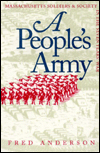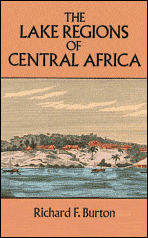May 21, 2007
Gratuitous Historickal Posting (TM)
As most of you probably know, fellow Moo-Knewvian Annika posted her last journal post this weekend. She's off to swot for the bar exam and plans to return to these here WorldWideWebs in the capacity of a semi-guest blogger hither and yon. We wish her the best of luck, but I hope she keeps the AJ site up because I find that rotating self-image cartoon thingy of her up in the top left corner to be endlessly mesmerizing.
Anyway, Annika very kindly mentioned your humble correspondent as a source for history posting. Flattery will get you absolutely everywhere with ol' Robbo, so I was spurred to throw down two points which happen to be bubbling in my brain today.
The first centers on this book, which I just recently started:

A People's Army: Massachusetts Soldiers and Society in the Seven Years' of War by Fred Anderson. The book eventually will get into all kinds of social and economic metrics, in addition to the actual experience of fighting the French and the Indians, but I simply wanted to point out that the first 25 pages or so provide the single best damn overview of pre-Revolutionary political and military developments in the Colonies I think I've ever come across. Anderson is a terrific historickal writer (I also love his much longer treatment of the French & Indian War) and, as I've said many times before, this is a period of American history which gets sadly ignored these days, but is nonetheless critical to helping us understand how the United States got to be the United States.
The other point, for those of you who might like a slightly more modern flavor, is that I've started in on Sir Richard Burton's account of his wanderings across what is now Tanzania:

The Lake Regions of Central Africa by Sir Richard F. Burton. Burton was one of the more flamboyant Victorian adventurers, with an intense interest in almost everything around him as well. This chronicle is fascinating both for his observations about the locals as well as for the many aspects of his own character that show through.
My copy, a hardback issued in the early 90's, is actually titled Journey To The Source of the Nile, which is very close to John Hanning Speke's The Discovery of the Source of the Nile. Speke, another explorer, accompanied Burton on his trip into the East African interior in 1857 in the search for the fabled Great Lakes there. Burton was the first to spot Lake Tanganyika, but Speke, pressing on without him, came across Lake Victoria. While he couldn't prove it (for the loss of most of his surveying equipment), Speke was of the opinion that Victoria was a/the source of the Nile, and said so when he returned to England despite an apparent agreement between the two men to keep the information to themselves until they could announce it together and coordinate plans to go back and confirm the findings. When Burton arrived home a few days later, he found that Speke had stolen all of the thunder for himself. A furious feud broke out between them as a result. It was to have culminated in a public debate at Bath in September, 1864, however on the morning of the debate, Speke managed to kill himself while out bird-shooting. (Whether this was suicide or an accident has never been completely decided.)
One of the results of this feud is that Burton never ever mentions Speke by name in his account of the journey, referring to him only as "my companion" throughout the text. I don't know whether the publishers changed the title of my copy to boost its sales attractiveness or to take sides in the Burton/Speke feud by getting in a dig at the latter.
Posted by Robert at May 21, 2007 10:31 AM | TrackBackThe Burton book is good (but very politically incorrect). If you like it, it is worth looking for his account of his journey to Mecca and Medina.
Posted by: steve at May 22, 2007 09:42 AM

 Image courtesy of the lovely and talented
Image courtesy of the lovely and talented 